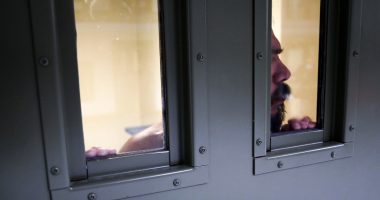
After deliberating less than two hours Wednesday, a jury here found Mark Forkner, who was Boeing Co. BA -0.45% ’s chief technical pilot during the aircraft’s development, not guilty of deceiving a Federal Aviation Administration training official about a flight-control system blamed for sending two of the jets into fatal nosedives in 2018 and 2019.
It was a swift conclusion to a long-running probe by federal agents and prosecutors into what were among history’s worst aviation disasters. In addition to the lives lost, the 737 MAX crashes disrupted global aviation, spurred regulatory changes and cost Boeing billions of dollars.
Mr. Forkner’s acquittal will likely dissuade attempts to hold individuals accountable for aviation disasters, which often involve complex chains of events and multiple mistakes and omissions by different parties, said Kenneth Quinn, former FAA chief counsel who has represented defendants in criminal probes arising from crashes.
“It really is game over in the United States for federal prosecutors to try to hold individuals criminally responsible for crashes absent demonstrable evidence of intentional conduct,” Mr. Quinn said.
It can be hard to win such convictions, he said, because jurors tend to sympathize with individuals and not companies involved in tragedies.
Boeing agreed last year to pay $2.5 billion to resolve a charge that two of its employees misled the FAA. Mr. Forkner was the only employee later indicted. Jurors found him not guilty of four counts of wire fraud.
A Justice Department spokesman said pursuing individuals is a priority and prosecutors “will follow facts of current and future investigations wherever they lead.”
David Gerger, one of Mr. Forkner’s attorneys, said justice was done in Fort Worth. “Juries are smart—they want to know the whole story. They figured it out.”
While prosecutors focused on Mr. Forkner, defense attorneys sought to draw jurors’ attention to Boeing’s engineering errors and missteps by others involved in the 737 MAX’s development and certification. They accused the government of making Mr. Forkner a scapegoat. “This is a massive corporate failure,” Jeff Kearney, an attorney for Mr. Forkner, said in his closing argument.
Mr. Forkner was charged with lying to the FAA as a means to defraud Boeing’s airline customers, specifically Texas-based American Airlines Group Inc. AAL 1.28% and Southwest Airlines Co. LUV 0.73%
In his role in the 737 MAX’s development, Mr. Forkner was in charge of seeking FAA approvals for pilot training materials and requirements. His attorneys reminded jurors that Boeing engineers, not Mr. Forkner, were involved in designing and revising the flight-control system known as MCAS without sufficient safeguards. They said Mr. Forkner was kept in the dark by his Boeing colleagues and didn’t lie to an FAA training official.
Prosecutors alleged that Mr. Forkner worked to defraud the FAA official whose approval he sought for lighter 737 MAX training requirements prized by Boeing and airlines that wanted to avoid expensive simulator training for pilots. They argued Mr. Forkner tricked the FAA official into removing mention of MCAS from pilot training materials to make Boeing tens of millions of dollars.
Prosecutors urged jurors not to let Mr. Forkner’s lawyers distract them.
“They spent their time blaming everyone else,” prosecutor Cory Jacobs said in his closing arguments Wednesday.
While it wasn’t mentioned at Mr. Forkner’s trial, the absence of MCAS in pilot manuals and training was cited as a contributor to the first 737 MAX crash in late 2018. Indonesian investigators probing the Lion Air crash said in their final report the lack of information “made it more difficult for flight crews to properly respond” to the system’s misfire. They also cited design, airline and other missteps.
U.S. District Judge Reed O’Connor reminded jurors Mr. Forkner wasn’t charged with causing any crashes.
Whether Mr. Forkner knew the flight-control system had been made more potent was a point of contention at his trial. The government argued Mr. Forkner did, but the defense said Boeing engineers never told him.
Missing from the four-day trial was any mention of the tragedies’ human toll. Defense attorneys had requested the judge exclude “victim-impact evidence,” calling it unfairly prejudicial. Prosecutors didn’t oppose the request and sought to limit mention of the accidents altogether to avoid what they described as “a sideshow about plane crashes” that would confuse the jury.
During arguments and testimony, federal prosecutors generally referred to the crashes as “incidents,” which in aviation lingo means no one died. It was instead Mr. Forkner’s attorneys who more frequently spoke of “accidents,” the industry term used when crashes result in death.
Chicago attorney Bob Clifford, who represents 737 MAX crash victims’ families, said: “These are not incidents. They were avoidable horrific crashes.” He criticized Mr. Forkner’s prosecution as “a lukewarm effort to get a conviction” that let senior Boeing management off the hook. Boeing declined to comment.
The Justice Department declined to comment. The agency’s deal with Boeing said senior company management wasn’t involved in the misconduct.
Crash victims’ families represented by Mr. Clifford are separately seeking to persuade a court that the Justice Department failed to meet a requirement to consult them before entering into its criminal settlement with Boeing.
The Justice Department has apologized but said it didn’t have a legal obligation to do so.
Write to Andrew Tangel at [email protected]
The Boeing MAX Crashes
More WSJ coverage, selected by the editors
Copyright ©2022 Dow Jones & Company, Inc. All Rights Reserved. 87990cbe856818d5eddac44c7b1cdeb8









